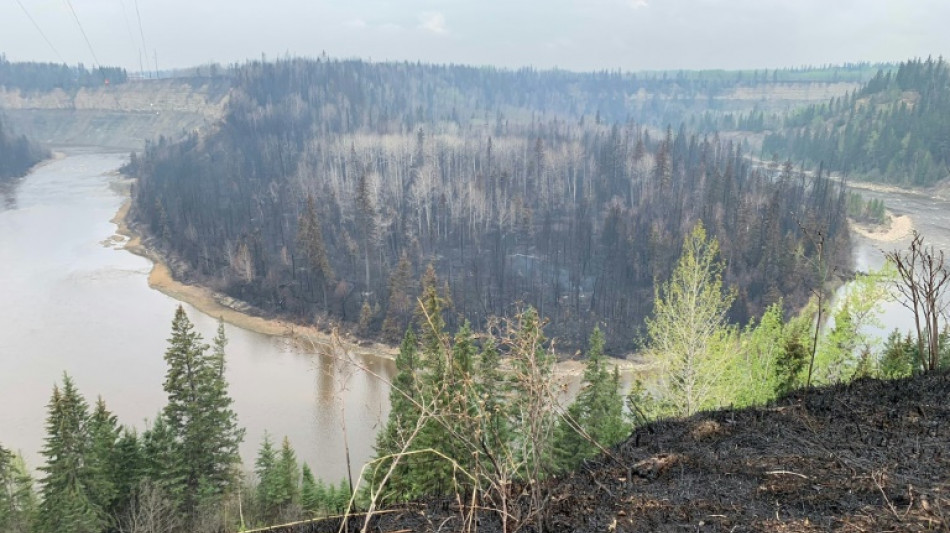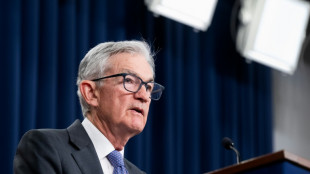
-
 Trump says US will take Greenland 'one way or the other'
Trump says US will take Greenland 'one way or the other'
-
Asian equities, precious metals surge as US Justice Dept targets Fed

-
 Myanmar pro-military party claims Suu Kyi's seat in junta-run poll
Myanmar pro-military party claims Suu Kyi's seat in junta-run poll
-
Fed chair Powell says targeted by federal probe

-
 Trailblazing Milos Raonic retires from tennis
Trailblazing Milos Raonic retires from tennis
-
Australia recalls parliament early to pass hate speech, gun laws

-
 'One Battle After Another,' 'Hamnet' triumph at Golden Globes
'One Battle After Another,' 'Hamnet' triumph at Golden Globes
-
Japan aims to dig deep-sea rare earths to reduce China dependence

-
 Top UN court to hear Rohingya genocide case against Myanmar
Top UN court to hear Rohingya genocide case against Myanmar
-
US sends more agents to Minneapolis despite furor over woman's killing

-
 Trump says Iran 'want to negotiate' after reports of hundreds killed in protests
Trump says Iran 'want to negotiate' after reports of hundreds killed in protests
-
Bangladesh's powerful Islamists prepare for elections

-
 NBA-best Thunder beat the Heat as T-Wolves edge Spurs
NBA-best Thunder beat the Heat as T-Wolves edge Spurs
-
Ukraine's Kostyuk defends 'conscious choice' to speak out about war

-
 Trump says working well with Venezuela's new leaders, open to meeting
Trump says working well with Venezuela's new leaders, open to meeting
-
Asian equities edge up, dollar slides as US Fed Reserve subpoenaed

-
 Hong Kong court hears sentencing arguments for Jimmy Lai
Hong Kong court hears sentencing arguments for Jimmy Lai
-
Powell says Federal Reserve subpoenaed by US Justice Department

-
 Chalamet, 'One Battle' among winners at Golden Globes
Chalamet, 'One Battle' among winners at Golden Globes
-
Turning point? Canada's tumultuous relationship with China

-
 Eagles stunned by depleted 49ers, Allen leads Bills fightback
Eagles stunned by depleted 49ers, Allen leads Bills fightback
-
Globes red carpet: chic black, naked dresses and a bit of politics

-
 Maduro's fall raises Venezuelans' hopes for economic bounty
Maduro's fall raises Venezuelans' hopes for economic bounty
-
Golden Globes kick off with 'One Battle' among favorites

-
 Australian Open 'underdog' Medvedev says he will be hard to beat
Australian Open 'underdog' Medvedev says he will be hard to beat
-
In-form Bencic back in top 10 for first time since having baby

-
 Swiatek insists 'everything is fine' after back-to-back defeats
Swiatek insists 'everything is fine' after back-to-back defeats
-
Wildfires spread to 15,000 hectares in Argentine Patagonia

-
 Napoli stay in touch with leaders Inter thanks to talisman McTominay
Napoli stay in touch with leaders Inter thanks to talisman McTominay
-
Meta urges Australia to change teen social media ban

-
 Venezuelans await political prisoners' release after government vow
Venezuelans await political prisoners' release after government vow
-
Lens continue winning streak, Endrick opens Lyon account in French Cup

-
 McTominay double gives Napoli precious point at Serie A leaders Inter
McTominay double gives Napoli precious point at Serie A leaders Inter
-
Trump admin sends more agents to Minneapolis despite furor over woman's killing

-
 Allen magic leads Bills past Jaguars in playoff thriller
Allen magic leads Bills past Jaguars in playoff thriller
-
Barca edge Real Madrid in thrilling Spanish Super Cup final

-
 Malinin spearheads US Olympic figure skating challenge
Malinin spearheads US Olympic figure skating challenge
-
Malinin spearheads US figure Olympic figure skating challenge

-
 Iran rights group warns of 'mass killing', govt calls counter-protests
Iran rights group warns of 'mass killing', govt calls counter-protests
-
'Fragile' Man Utd hit new low with FA Cup exit

-
 Iran rights group warns of 'mass killing' of protesters
Iran rights group warns of 'mass killing' of protesters
-
Demonstrators in London, Paris, Istanbul back Iran protests

-
 Olise sparkles as Bayern fire eight past Wolfsburg
Olise sparkles as Bayern fire eight past Wolfsburg
-
Man Utd knocked out of FA Cup by Brighton, Martinelli hits hat-trick for Arsenal

-
 Troubled Man Utd crash out of FA Cup against Brighton
Troubled Man Utd crash out of FA Cup against Brighton
-
Danish PM says Greenland showdown at 'decisive moment' after new Trump threats

-
 AC Milan snatch late draw at Fiorentina as title rivals Inter face Napoli
AC Milan snatch late draw at Fiorentina as title rivals Inter face Napoli
-
Venezuelans demand political prisoners' release, Maduro 'doing well'

-
 'Avatar: Fire and Ashe' leads in N.America for fourth week
'Avatar: Fire and Ashe' leads in N.America for fourth week
-
Bordeaux-Begles rout Northampton in Champions Cup final rematch


'Perfect storm' of heat, dryness fuel western Canada's extreme wildfires
Dry vegetation, record temperatures and powerful winds: this "perfect storm" of weather phenomena fueled the massive forest fires in western Canada's Alberta province this year, according to researchers.
The extent of the fires and their appearance so early in the year illustrate the impacts of climate change, scientists say.
"We've already had 390,000 hectares (963,710 acres) burned. So it's already 10 times the typical fire year and we're really just getting started," said Danielle Smith, premier of Alberta province where a state of emergency was declared.
"It's an extraordinary (and) unprecedented event, which is I think what we have to be prepared for in future," she told reporters on Tuesday.
Around 30,000 people have been ordered to evacuate their homes while hundreds of firefighters work to control the flames.
"It is an exceptional year insofar as the accumulation of burned areas is very rapid, as is the number of very large fires at the same time," Yan Boulanger, a specialist in forest fires at the Canadian ministry for natural resources, told AFP.
The vast majority of fires are of human origin, including cigarette butts, campfires that weren't properly snuffed out or sometimes malicious acts, he said.
- 'Dangerous' month of May -
Spring is a risky time for fires in the area, as no snow remains on the ground and it's before plants turn green.
"We end up with very dry undergrowth and trees that are also very flammable, because they have no leaves," said Boulanger, who noted that the conditions in recent weeks "have been very dry."
Terri Lang, a meteorologist for Environment Canada, said that dry conditions make spring a "dangerous time."
In early May, a weather phenomenon set in that "brought really unseasonably hot and dry conditions to the province," Lang told AFP.
A ridge of high pressure pushed aside the precipitation and kept the heat in place, breaking several temperature records in the region.
In the provincial capital of Edmonton, the mercury reached 28.9 degrees Celsius (84 degrees Fahrenheit) on May 1, beating the previous all-time high of 26.7C (80F) set almost a century ago. Farther north, it reached 32.2C (89.9F) in Fort McMurray on Thursday.
Added to this were strong winds fueled by the typical temperature differential between the cold north and the warmer south.
"It was a perfect storm," said Lang.
Boulanger added that "if the conditions remain extreme, it could last for weeks or months."
A previous major fire in 2016 disrupted production in the oil sands region near Fort McMurray, pummelling the nation's economy.
That fire took almost a year to be put out, Boulanger said.
- More common with global warming -
Diana Stralberg, a researcher in Edmonton for the Canadian Forest Service, explained that human-caused climate change is making the fire season longer and causing "extreme fire weather conditions" to occur more often.
"Although fire is a natural, forest-renewing process, more frequent fires, as well as fires followed by droughts, can interrupt regeneration of conifer trees" and lead to a withdrawal of wooded areas in favor of grasslands, the climate specialist told AFP.
Little by little, the forest is being nibbled away, with direct consequences for dozens of species of migratory birds and caribou.
"Modeling of future fire and vegetation conditions has shown that, in Alberta, up to 50 percent of upland boreal forests could be at risk of conversion to grassland systems by the end of the 21st century under high-end warming scenarios," said Stralberg.
More and more fires also lead to the massive emissions of greenhouse gases, further exacerbating climate change, in a mechanism researchers call the "fire-climate feedback loop."
Q.Jaber--SF-PST



